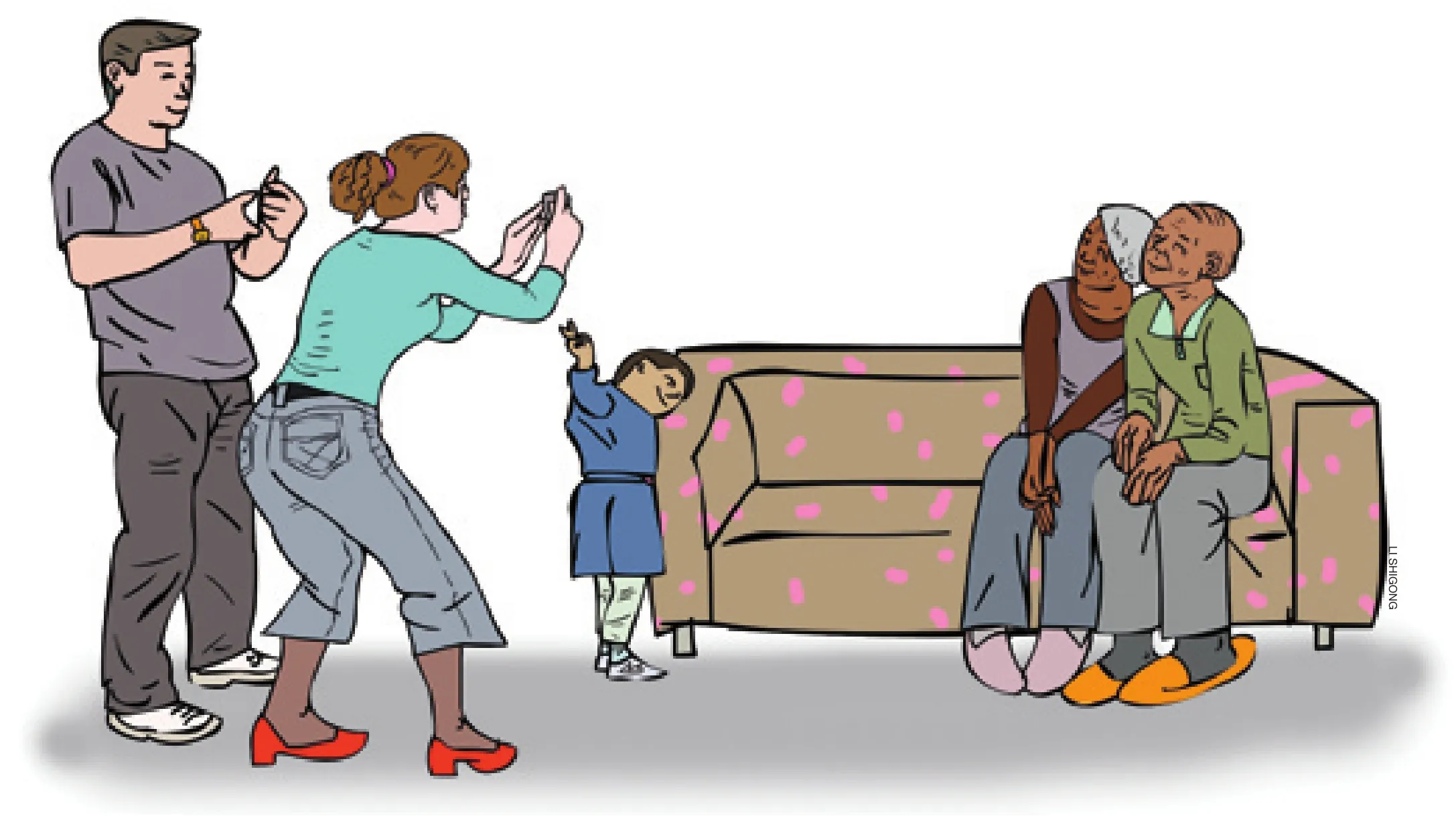Are Filial Piety Standards Achievable?
2012-10-14
Are Filial Piety Standards Achievable?

Recently, the All-China Women’s Federation and the National Commission on the Aging Problem of China, together with several other departments, jointly issued 24 filial piety standards. At the same time, a filial piety project will be promoted in 15 cities across the country in the following year by providing informational pamphlets free of charge, explaining the standards and spreading the ideals of filial piety.
China has a long tradition of stressing filial piety, and filial piety forms the core of family values. Some people welcome the filial piety standards, holding that it’s beneficial to passing on the traditional virtue in modern society. However, some said those standards may not be so easy to implement. For example, one standard requires children “to express love to your parents verbally.” This is not easy for the majority of Chinese, who do not have the Western habit of saying “I love you” to people around them, including their parents. The following are excerpts of some opinions:
Updated code of conduct
Fu Dalin (The Beijing Times): The purpose of putting forward the filial piety standards is to promote the traditional Chinese virtue of respecting the elderly.
The filial stories in old times have been passed down from generation to generation, but in the process of modernization, these stories are losing their esteem as the status of filial piety in society is being shaken. In some extreme cases, children refuse to support their elderly parents and even abuse them. These unfortunate elderly people don’t feel any filial piety from their children.
Compared with the traditional filial devotion, these new standards are more up to date and relevant to modern society. They emphasize the psychological care for the elderly, for instance. However, in modern society based on the rule by law, inner moral discipline is being replaced by external legal regulation. In this case, filial piety—which depends on people’s moral sense and inner discipline—seems unable to prevail in modern society. What we need now is a code of conduct that helps to persuade people to practice filial piety.
These standards do not intend to force people to obey filial principles by law and do not demand that everyone strictly carry out every item. Instead, it offers a guideline for the country’s youth to trace back to the roots of China’s family-oriented culture and practice filial piety in their own flexible ways.
Yuan Guangkuo (www.xinhuanet. com): The filial piety standards are actually an innovative way of inheriting the essence of filial culture. It’s easy to see that many items in the old filial code of conduct are out of date. For example, one story tells of a son lying down on the surface of a frozen river in order to thaw the ice to catch a fish for his stepmother. Today it is necessary to update the code of conduct while leaving the core message of filial piety unchanged.
The most striking highlight of the new standards is its close connection to modern life, which reflects what the elderly people need the most in modern times. For example, it is mentioned that children should teach their parents how to use the Internet or buy suitable insurance for their parents. These two items embody the change and development of society. Besides, the new standards also mention that children should encourage a single parent to get remarried. This is a breakthrough for traditional Chinese thinking, fully demonstrating children’s care for their parents’psychological and spiritual health.
Doubts and controversies on the new filial piety standards are to be expected. Actually, as a moral requirement for human beings, filial piety is unlikely to have perfect standards. The standards are not rigid doctrines, but a kind of reminder and suggestion to value the family. The new standards can be seen as an objective. People should strive for the goal, but we needn’t force anyone to honor all of the items.
Unrealistic goals
Shao Junguo (Jinan Daily): The new standards are very specific. However, most lowincome people will find the new standards too ambitious. To what extent can we expect these people to attain these filial objectives?
Real filial piety is not something to be shown off to others, but something buried deep in one’s heart—an expression of gratitude. Due to different living and working environment, the ways of practicing filial piety are of course different.
Actually, parents do not have too much to demand from their children. The young generation only needs to try their best to fulfill their parents’ basic material needs and respect their free choices. When these things are done, even if there are no filial standards to determine what the children must do, elderly people can still live a fulfilling life with their children.
Xiao Fuxing (The Beijing News): Filial culture is something that is supposed to take shape and develop naturally among ordinary people. As for the government, it can try to steer the society toward filial devotion by building up more state-run nursing homes, which will have a more tangible effect than issuing filial standards.
China has entered the aging period, faced with pressing demographic problems. As the traditional model of family supporting the elderly is still mainstream, whether children respect their elderly parents will decide if the old people can live a happy life in their final years. The issuing of the new filial standards shows that this social problem is being noticed by the majority, but the question is, what is the use of issuing such items like, “teaching parents to use the Internet,” “supporting a single parent to get remarried,” or “calling your parents every week?”
I doubt whether such a set of standards of filial devotion can help to reverse the trend of slipping filial piety in society. The foundation of filial piety is morality. Today, many factors have led to the deterioration of the society’s moral standards, so it’s quite doubtful that the new filial standards can really reach the expected goal.
The aging population is a social problem that demands an urgent solution. However, the solution does not lie in the issuing of these new filial standards, but in the restoration of social morality and filial ethics.
Deng Haijian (China Youth Daily): The ambitious new filial standards seem out of reach for the vast majority of Chinese.
These new standards are easier to understand and more up to date and thus will surely help to promote filial piety and even the overall moral level in the Chinese society. But, there are still critical questions about them.
Are these standards really the ideal for elderly people in their late years? For example, the new standards require that children should always bring their parents to important activities, teach them to use the Internet, take photos and hold birthday parties for them. The fact is that for the elderly parents living in China’s vast rural areas, these items are absolutely impossible. These goals are not even easily attainable for people living in urban areas. What the elderly people need is not occasional grand ceremonies, but humble yet sustainable care. Photo taking, banquets and other important occasions—is this really the so-called filial piety they need?
Actually, in most cases, it is not that children don’t want to look after their parents, but they are restricted by a harsh reality. While most young people are struggling with a mortgage, high tuition fees, and occasionally high medical expenses, it’s really too difficult for them to live up to the new filial standards. The most important thing now is to create a social environment that makes it possible for the young to fulfill their filial duties.
